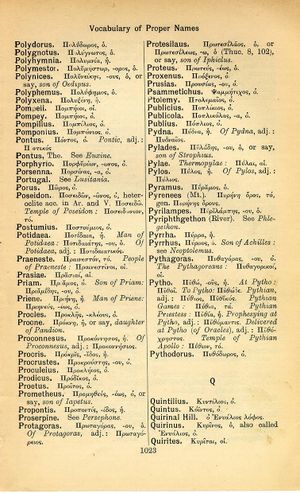Procne: Difference between revisions
From LSJ
Κακοῦ γὰρ ἀνδρὸς δῶρ' ὄνησιν οὐκ ἔχει → Nil utilitatis improbi in donis viri → Geschenke eines Schurken sind nicht von Gewinn
m (Text replacement - "link={{" to "link={{") |
m (Text replacement - "}}]]" to "}}]]") |
||
| Line 1: | Line 1: | ||
{{WoodhouseENELnames | {{WoodhouseENELnames | ||
|Text=[[File:woodhouse_1023.jpg|thumb | |Text=[[File:woodhouse_1023.jpg|thumb | ||
|link={{filepath:woodhouse_1023.jpg | |link={{filepath:woodhouse_1023.jpg}}]]Πρόκνη, ἡ, or say, <b class="b2">daughter of Pandion.</b> | ||
}} | }} | ||
{{Lewis | {{Lewis | ||
Revision as of 10:11, 15 August 2017
English > Greek (Woodhouse)
Πρόκνη, ἡ, or say, daughter of Pandion.
Latin > English (Lewis & Short)
Procnē: ēs, v. Progne.
Latin > French (Gaffiot 2016)
Procnē¹⁴ (-gnē), ēs, f. (Πρόκνη),
1 Procné [fille de Pandion, changée en hirondelle] : Ov. M. 6, 440 || [poét.] une hirondelle : Virg. G. 4, 15
2 île voisine de Rhodes : Plin. 5, 133.
Latin > German (Georges)
Procnē (Prognē), ēs, f. (Πρόκνη), I) Tochter des attischen Königs Pandion, Schwester der Philomela und Gemahlin des trazischen Königs Tereus, wurde in eine Schwalbe verwandelt (s. Philomēladas Nähere), Ov. met. 6, 440. Hyg. fab. 45 u.a. – II) meton., die Schwalbe, Verg. georg. 4, 15. Ov. fast. 2, 855; trist. 5, 1, 60: Progne inter asseres minuriens, Sidon. epist. 2, 2, 14.

